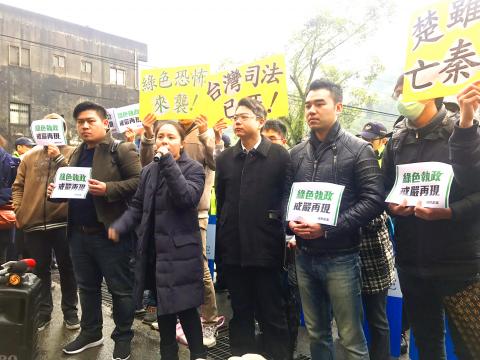The New Party yesterday decried what it said was the Democratic Progressive Party’s (DPP) “barbaric arrest” of four of its members for alleged violations of the National Security Act (國家安全法).
Investigation Bureau officers at about 6:30am yesterday raided the homes of New Party spokesman Wang Ping-chung (王炳忠) and party members Hou Han-ting (侯漢廷), Lin Ming-cheng (林明正) and Chen Ssu-chun (陳斯俊) in Taipei and New Taipei City, seizing documents, computers and cellphones, and taking the four to the bureau for questioning on the grounds that they allegedly collected and provided intelligence to the Chinese Communist Party (CCP).
“What intelligence could they possibly collect and provide? What have they done other than openly oppose [Taiwanese] independence and advocate unification” between Taiwan and China, New Party Deputy Chairman Lee Sheng-feng (李勝峰) told a news conference in Taipei.

Photo: CNA
Wang, Hou and Lin are household names for their anti-independence, pro-unification remarks in the media, and by targeting the three most well-known young members of the party, the DPP is attempting to silence the New Party, Lee said.
Wang’s lawyer, Chen Li-ling (陳麗玲), said the four were denied the right to seek legal assistance before their arrest, because they were initially slated to be summoned as witnesses at 8:30am yesterday.
“However, their residences were raided at 6am, which was a procedural violation,” she added.
By perpetrating a move that is reckless, barbaric and “messed up,” the DPP is forcing the public to rebel, and the New Party will respond by devoting itself to the local elections next year to overthrow the DPP to let it “feel people’s wrath and bring about justice,” he said.
The four were arrested in connection with an espionage case implicating alleged Chinese spy Zhou Hongxu (周泓旭), Lee said, but added that he did not know Zhou personally, nor did he know how close Zhou was with the four men.
“The DPP can ignore the need to drive economic growth and discourage diversity. However, it will never take away the pride of being Chinese from New Party Youth Corps members,” New Party Youth Corps head Yang Shih-kuang (楊世光) said, adding that his party would do everything in its power to clear his colleagues’ names through legal action.
New Party member Kolan Kaoti (戈蘭高地), who provided Chen Ssu-chun with accommodation, said she was terrified and compared the investigators to Gestapo because they made a mess of Chen Ssu-chun’s belongings.
“The move was like a reprise of the White Terror,” she said.
“The DPP will have bad karma for the many evil deeds it has done,” Hou’s mother said.
Separately, Chinese Nationalist Party (KMT) spokesman Hung Meng-kai (洪孟楷) said the raids and arrests were disproportionate, as authorities did not have enough evidence to prove that the four had committed an offense.
The move has raised public concern that the DPP is reinstating martial law, he said, urging investigators and prosecutors to promptly give an explanation to ease concerns.
Deputy Minister of Justice Chen Ming-tang (陳明堂) said he knew the details of the case, but declined to elaborate, citing the confidentiality principle on cases under investigation.

Alain Robert, known as the "French Spider-Man," praised Alex Honnold as exceptionally well-prepared after the US climber completed a free solo ascent of Taipei 101 yesterday. Robert said Honnold's ascent of the 508m-tall skyscraper in just more than one-and-a-half hours without using safety ropes or equipment was a remarkable achievement. "This is my life," he said in an interview conducted in French, adding that he liked the feeling of being "on the edge of danger." The 63-year-old Frenchman climbed Taipei 101 using ropes in December 2004, taking about four hours to reach the top. On a one-to-10 scale of difficulty, Robert said Taipei 101

Nipah virus infection is to be officially listed as a category 5 notifiable infectious disease in Taiwan in March, while clinical treatment guidelines are being formulated, the Centers for Disease Control (CDC) said yesterday. With Nipah infections being reported in other countries and considering its relatively high fatality rate, the centers on Jan. 16 announced that it would be listed as a notifiable infectious disease to bolster the nation’s systematic early warning system and increase public awareness, the CDC said. Bangladesh reported four fatal cases last year in separate districts, with three linked to raw date palm sap consumption, CDC Epidemic Intelligence

US climber Alex Honnold left Taiwan this morning a day after completing a free-solo ascent of Taipei 101, a feat that drew cheers from onlookers and gained widespread international attention. Honnold yesterday scaled the 101-story skyscraper without a rope or safety harness. The climb — the highest urban free-solo ascent ever attempted — took just more than 90 minutes and was streamed live on Netflix. It was covered by major international news outlets including CNN, the New York Times, the Guardian and the Wall Street Journal. As Honnold prepared to leave Taiwan today, he attracted a crowd when he and his wife, Sanni,

Taiwanese and US defense groups are collaborating to introduce deployable, semi-autonomous manufacturing systems for drones and components in a boost to the nation’s supply chain resilience. Taiwan’s G-Tech Optroelectronics Corp subsidiary GTOC and the US’ Aerkomm Inc on Friday announced an agreement with fellow US-based Firestorm Lab to adopt the latter’s xCell, a technology featuring 3D printers fitted in 6.1m container units. The systems enable aerial platforms and parts to be produced in high volumes from dispersed nodes capable of rapid redeployment, to minimize the risk of enemy strikes and to meet field requirements, they said. Firestorm chief technology officer Ian Muceus said